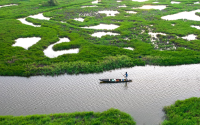14 April 2005Indian Country TodayDeborah Williams
Global warming is wreaking havoc in Alaska. Over the past 40 years, annual temperatures have increased 4 to 5 degrees Fahrenheit, and winter temperatures have warmed 8 to 10 degrees Fahrenheit. For many reasons, Alaska Natives are feeling the heat most dramatically and adversely. Scientists agree that Alaska has warmed more than any other place on Earth - over four times the global average. This significant, on-the-ground temperature increase is consistent with previous climactic predictions. For years, scientists have determined that global warming would initially be most evident at high latitudes and increasingly substantial in the mid-latitudes. In essence, Alaska is the tip of the melting iceberg, or the canary in the coal mine with an impending heat stroke. Alaska Natives are the people who rely most on Alaska's ice, seas, marine mammals and traditional lifestyles, and therefore experience global warming's adverse impacts most acutely. The polar ice cap's retreat due to global warming threatens a vast, circumpolar ecosystem and its polar bears, walruses, seals and whales, while northern Alaska communities are left increasingly vulnerable to unprecedented storm-wave erosion. Roads, buildings and other structures are collapsing as ice-rich permafrost soils liquefy. These and other dramatic occurrences in Alaska portend what's in store for the rest of the United States - and the planet - if we do not act now to reduce greenhouse gases. The evidence of global warming in the ''last frontier'' is widespread. The Yukon River's temperature has recently increased more than 10 degrees, resulting in diseased salmon: which negatively affects Alaska Natives throughout the drainage. Spruce and other trees throughout Alaska are dying at historically high rates due to global warming-induced insect infestations. Glaciers are melting at unprecedented rates. Virtually every aspect of traditional Alaska Native life is impacted. As noted in the recently released Arctic Climate Impact Assessment, indigenous people report that not only is sea ice declining, its quality and timing are changing, with important negative repercussions for marine hunters. Others report that berries are reduced in quality and quantity. There is widespread concern about caribou habitat diminishing as larger vegetation moves northward. Because of these and other dramatic changes, traditional knowledge is jeopardized, as are the cultural structures and nutritional needs of Alaska's indigenous people. Perhaps most visually, several Native communities are literally starting to fall into the sea; and this is just the beginning. The Alaska Native village of Shishmaref, in particular, has already lost many buildings to the ocean due to melting permafrost and increased storms from global warming. The cost to move Shishmaref alone, with its 600 residents, has recently been estimated to be over $150 million. Alaska helps demonstrate that the costs of not dealing with global warming exceed the costs of reducing greenhouse gas emissions. Clearly, we need to move quickly to address this problem. There is an international scientific consensus that most of the warming observed over the last 50 years is attributable to human activities. It is clear from ice cores and other evidence of past climate conditions that rising atmospheric carbon dioxide levels are correlated with rising global temperatures. Primarily because of the burning of oil, gas and coal by humans, carbon dioxide and other heat-trapping gases in the atmosphere have increased by 35 percent since the start of the Industrial Revolution. We need to reduce greenhouse gas emissions now. The threat to the world, to the nation and to Alaska from global warming is staggering. Our nation must do something to address global warming by capping carbon emissions: and the state has a critical role to play as the harbinger of things to come if global warming is not addressed. Most Americans - including most decision makers - do not understand the astounding scope, ecological significance, and economic and social costs being experienced, especially by First Nation people on American soil, in Alaska, right now due to global warming. This is not only an ecological issue: it is a human rights issue of tremendous proportions. Deborah L. Williams is executive director of the Alaska Conservation Foundation.






